Leadership and Management Principles: A Study of Activate Learning
VerifiedAdded on 2023/06/10
|11
|2771
|131
Essay
AI Summary
This essay provides a comprehensive analysis of leadership and management principles, focusing on their application within the Activate Learning Group. It begins by differentiating between leadership and management, highlighting the importance of leadership as a vital component of effective management. The essay delves into the core functions of management, including planning, organizing, leading, and controlling, and relates these functions to the practices observed at Activate Learning. It also examines Henry Fayol's principles of management, such as division of labor, authority and responsibility, and unity of command, assessing their relevance in contemporary organizational settings. Furthermore, the essay explores key leadership principles, such as creating a sense of responsibility, self-improvement, and technical competence, and evaluates how these principles are exemplified within Activate Learning's leadership structure. Through an analysis of Activate Learning's management and leadership practices, the essay identifies the institution's strengths and areas for improvement, emphasizing the importance of a clear vision, collaborative relationships, and data-driven decision-making in achieving organizational success. The essay concludes by underscoring the significance of continuous assessment and adaptation in maintaining effective leadership and management practices.
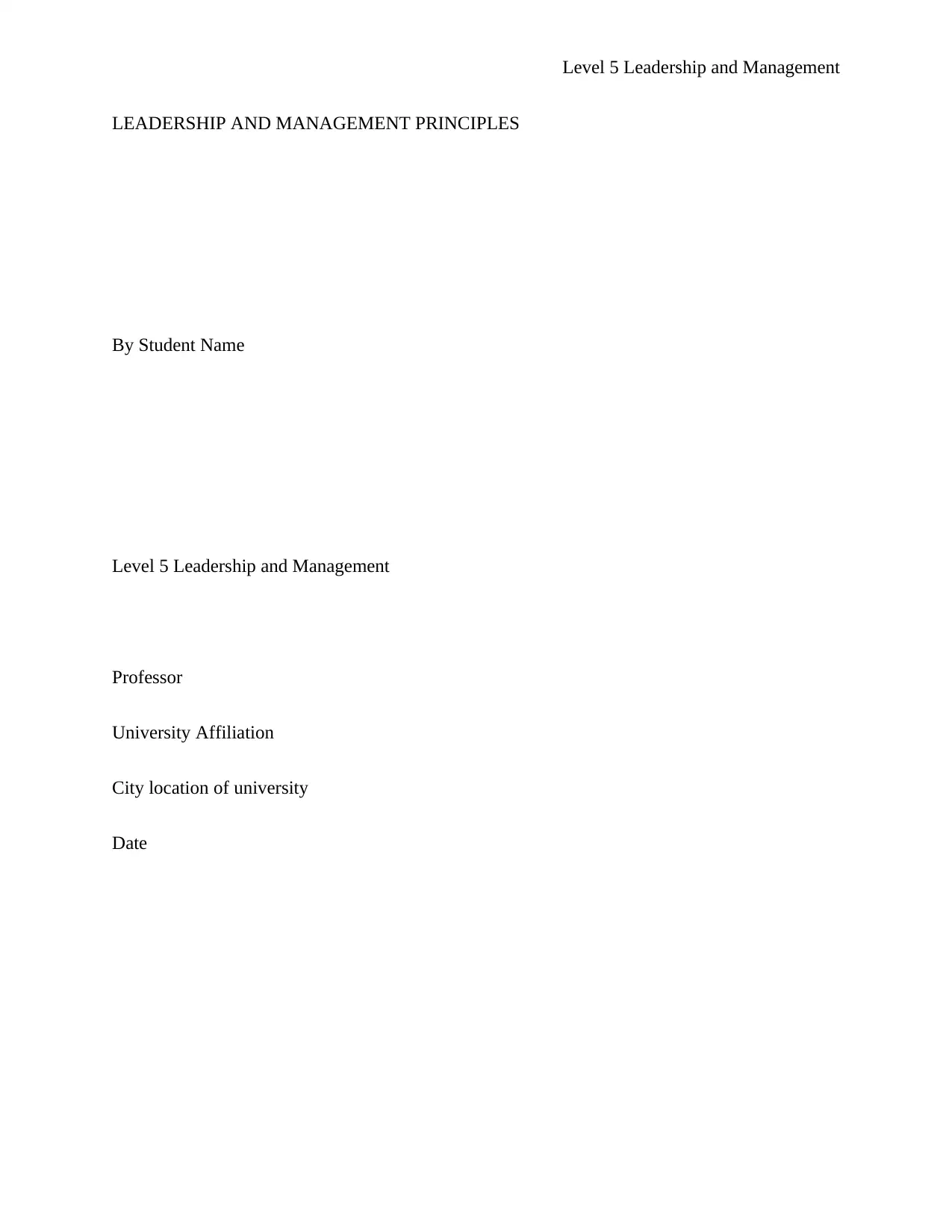
Level 5 Leadership and Management
LEADERSHIP AND MANAGEMENT PRINCIPLES
By Student Name
Level 5 Leadership and Management
Professor
University Affiliation
City location of university
Date
LEADERSHIP AND MANAGEMENT PRINCIPLES
By Student Name
Level 5 Leadership and Management
Professor
University Affiliation
City location of university
Date
Paraphrase This Document
Need a fresh take? Get an instant paraphrase of this document with our AI Paraphraser
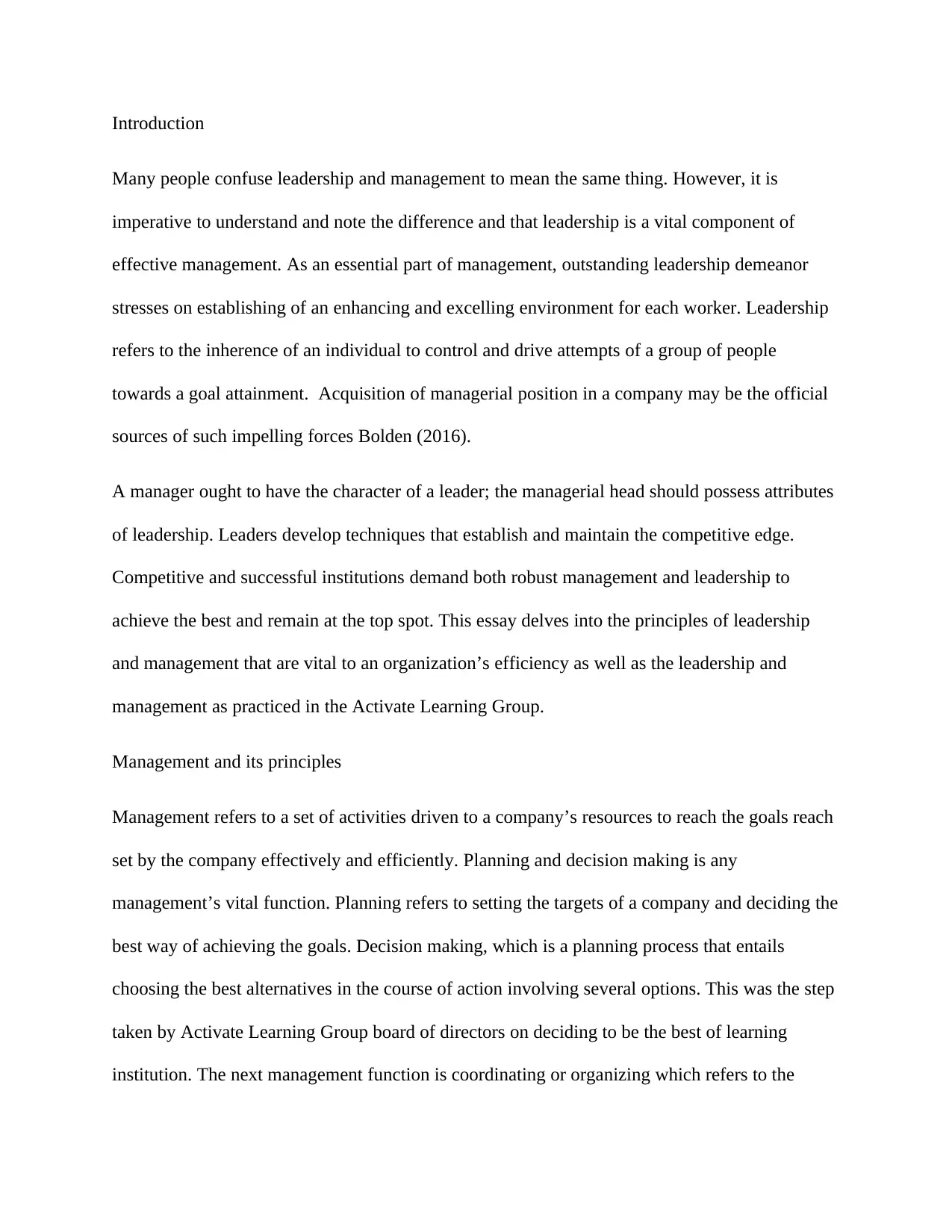
Introduction
Many people confuse leadership and management to mean the same thing. However, it is
imperative to understand and note the difference and that leadership is a vital component of
effective management. As an essential part of management, outstanding leadership demeanor
stresses on establishing of an enhancing and excelling environment for each worker. Leadership
refers to the inherence of an individual to control and drive attempts of a group of people
towards a goal attainment. Acquisition of managerial position in a company may be the official
sources of such impelling forces Bolden (2016).
A manager ought to have the character of a leader; the managerial head should possess attributes
of leadership. Leaders develop techniques that establish and maintain the competitive edge.
Competitive and successful institutions demand both robust management and leadership to
achieve the best and remain at the top spot. This essay delves into the principles of leadership
and management that are vital to an organization’s efficiency as well as the leadership and
management as practiced in the Activate Learning Group.
Management and its principles
Management refers to a set of activities driven to a company’s resources to reach the goals reach
set by the company effectively and efficiently. Planning and decision making is any
management’s vital function. Planning refers to setting the targets of a company and deciding the
best way of achieving the goals. Decision making, which is a planning process that entails
choosing the best alternatives in the course of action involving several options. This was the step
taken by Activate Learning Group board of directors on deciding to be the best of learning
institution. The next management function is coordinating or organizing which refers to the
Many people confuse leadership and management to mean the same thing. However, it is
imperative to understand and note the difference and that leadership is a vital component of
effective management. As an essential part of management, outstanding leadership demeanor
stresses on establishing of an enhancing and excelling environment for each worker. Leadership
refers to the inherence of an individual to control and drive attempts of a group of people
towards a goal attainment. Acquisition of managerial position in a company may be the official
sources of such impelling forces Bolden (2016).
A manager ought to have the character of a leader; the managerial head should possess attributes
of leadership. Leaders develop techniques that establish and maintain the competitive edge.
Competitive and successful institutions demand both robust management and leadership to
achieve the best and remain at the top spot. This essay delves into the principles of leadership
and management that are vital to an organization’s efficiency as well as the leadership and
management as practiced in the Activate Learning Group.
Management and its principles
Management refers to a set of activities driven to a company’s resources to reach the goals reach
set by the company effectively and efficiently. Planning and decision making is any
management’s vital function. Planning refers to setting the targets of a company and deciding the
best way of achieving the goals. Decision making, which is a planning process that entails
choosing the best alternatives in the course of action involving several options. This was the step
taken by Activate Learning Group board of directors on deciding to be the best of learning
institution. The next management function is coordinating or organizing which refers to the
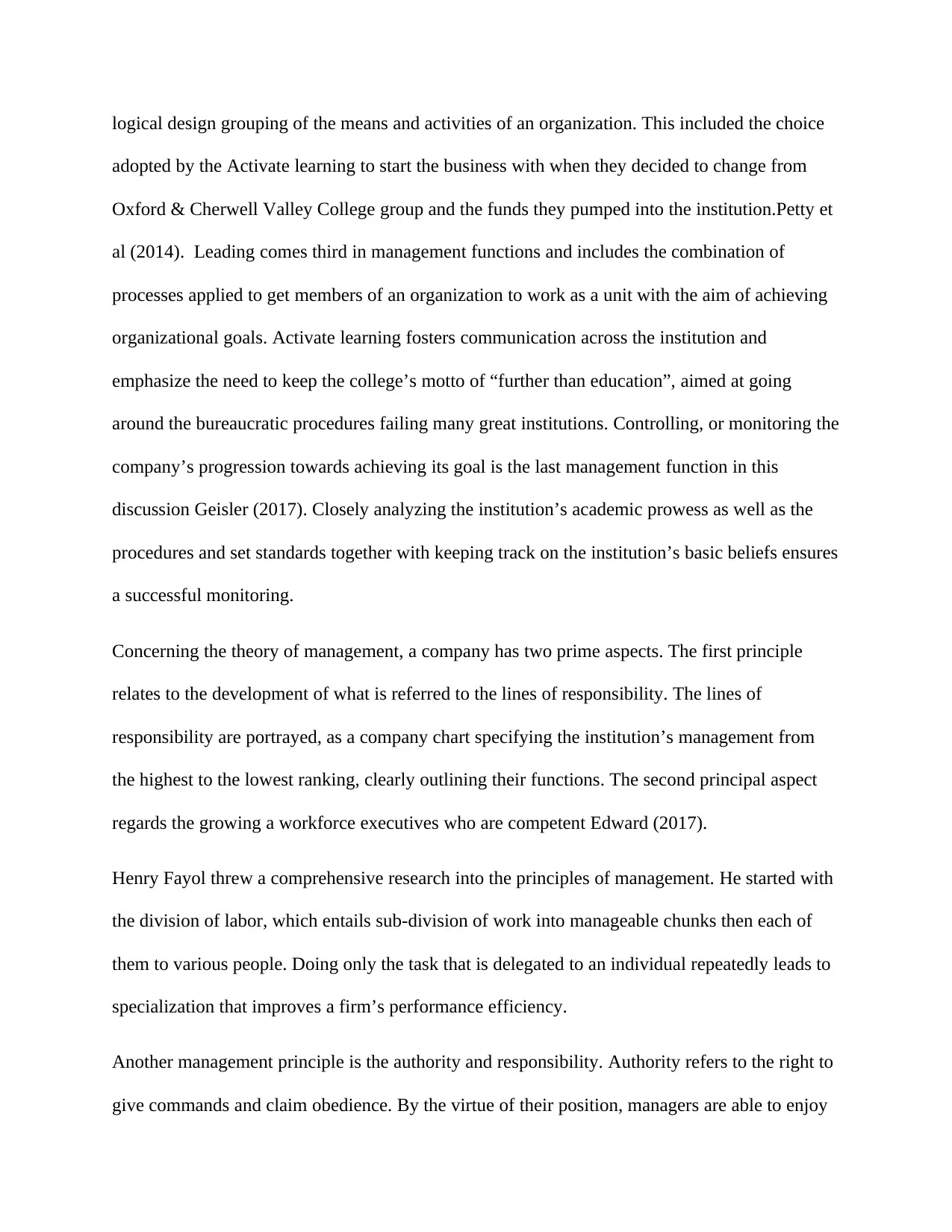
logical design grouping of the means and activities of an organization. This included the choice
adopted by the Activate learning to start the business with when they decided to change from
Oxford & Cherwell Valley College group and the funds they pumped into the institution.Petty et
al (2014). Leading comes third in management functions and includes the combination of
processes applied to get members of an organization to work as a unit with the aim of achieving
organizational goals. Activate learning fosters communication across the institution and
emphasize the need to keep the college’s motto of “further than education”, aimed at going
around the bureaucratic procedures failing many great institutions. Controlling, or monitoring the
company’s progression towards achieving its goal is the last management function in this
discussion Geisler (2017). Closely analyzing the institution’s academic prowess as well as the
procedures and set standards together with keeping track on the institution’s basic beliefs ensures
a successful monitoring.
Concerning the theory of management, a company has two prime aspects. The first principle
relates to the development of what is referred to the lines of responsibility. The lines of
responsibility are portrayed, as a company chart specifying the institution’s management from
the highest to the lowest ranking, clearly outlining their functions. The second principal aspect
regards the growing a workforce executives who are competent Edward (2017).
Henry Fayol threw a comprehensive research into the principles of management. He started with
the division of labor, which entails sub-division of work into manageable chunks then each of
them to various people. Doing only the task that is delegated to an individual repeatedly leads to
specialization that improves a firm’s performance efficiency.
Another management principle is the authority and responsibility. Authority refers to the right to
give commands and claim obedience. By the virtue of their position, managers are able to enjoy
adopted by the Activate learning to start the business with when they decided to change from
Oxford & Cherwell Valley College group and the funds they pumped into the institution.Petty et
al (2014). Leading comes third in management functions and includes the combination of
processes applied to get members of an organization to work as a unit with the aim of achieving
organizational goals. Activate learning fosters communication across the institution and
emphasize the need to keep the college’s motto of “further than education”, aimed at going
around the bureaucratic procedures failing many great institutions. Controlling, or monitoring the
company’s progression towards achieving its goal is the last management function in this
discussion Geisler (2017). Closely analyzing the institution’s academic prowess as well as the
procedures and set standards together with keeping track on the institution’s basic beliefs ensures
a successful monitoring.
Concerning the theory of management, a company has two prime aspects. The first principle
relates to the development of what is referred to the lines of responsibility. The lines of
responsibility are portrayed, as a company chart specifying the institution’s management from
the highest to the lowest ranking, clearly outlining their functions. The second principal aspect
regards the growing a workforce executives who are competent Edward (2017).
Henry Fayol threw a comprehensive research into the principles of management. He started with
the division of labor, which entails sub-division of work into manageable chunks then each of
them to various people. Doing only the task that is delegated to an individual repeatedly leads to
specialization that improves a firm’s performance efficiency.
Another management principle is the authority and responsibility. Authority refers to the right to
give commands and claim obedience. By the virtue of their position, managers are able to enjoy
⊘ This is a preview!⊘
Do you want full access?
Subscribe today to unlock all pages.

Trusted by 1+ million students worldwide
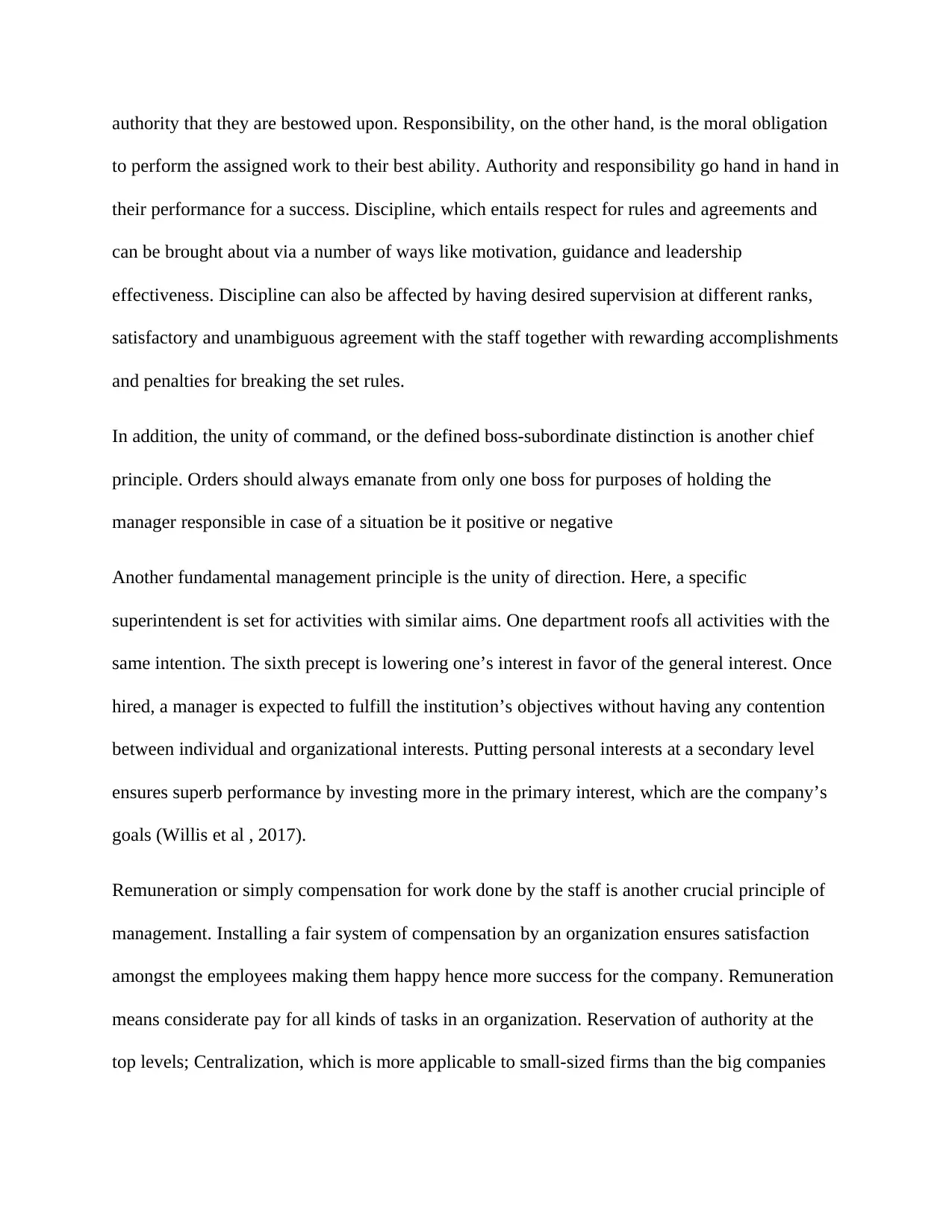
authority that they are bestowed upon. Responsibility, on the other hand, is the moral obligation
to perform the assigned work to their best ability. Authority and responsibility go hand in hand in
their performance for a success. Discipline, which entails respect for rules and agreements and
can be brought about via a number of ways like motivation, guidance and leadership
effectiveness. Discipline can also be affected by having desired supervision at different ranks,
satisfactory and unambiguous agreement with the staff together with rewarding accomplishments
and penalties for breaking the set rules.
In addition, the unity of command, or the defined boss-subordinate distinction is another chief
principle. Orders should always emanate from only one boss for purposes of holding the
manager responsible in case of a situation be it positive or negative
Another fundamental management principle is the unity of direction. Here, a specific
superintendent is set for activities with similar aims. One department roofs all activities with the
same intention. The sixth precept is lowering one’s interest in favor of the general interest. Once
hired, a manager is expected to fulfill the institution’s objectives without having any contention
between individual and organizational interests. Putting personal interests at a secondary level
ensures superb performance by investing more in the primary interest, which are the company’s
goals (Willis et al , 2017).
Remuneration or simply compensation for work done by the staff is another crucial principle of
management. Installing a fair system of compensation by an organization ensures satisfaction
amongst the employees making them happy hence more success for the company. Remuneration
means considerate pay for all kinds of tasks in an organization. Reservation of authority at the
top levels; Centralization, which is more applicable to small-sized firms than the big companies
to perform the assigned work to their best ability. Authority and responsibility go hand in hand in
their performance for a success. Discipline, which entails respect for rules and agreements and
can be brought about via a number of ways like motivation, guidance and leadership
effectiveness. Discipline can also be affected by having desired supervision at different ranks,
satisfactory and unambiguous agreement with the staff together with rewarding accomplishments
and penalties for breaking the set rules.
In addition, the unity of command, or the defined boss-subordinate distinction is another chief
principle. Orders should always emanate from only one boss for purposes of holding the
manager responsible in case of a situation be it positive or negative
Another fundamental management principle is the unity of direction. Here, a specific
superintendent is set for activities with similar aims. One department roofs all activities with the
same intention. The sixth precept is lowering one’s interest in favor of the general interest. Once
hired, a manager is expected to fulfill the institution’s objectives without having any contention
between individual and organizational interests. Putting personal interests at a secondary level
ensures superb performance by investing more in the primary interest, which are the company’s
goals (Willis et al , 2017).
Remuneration or simply compensation for work done by the staff is another crucial principle of
management. Installing a fair system of compensation by an organization ensures satisfaction
amongst the employees making them happy hence more success for the company. Remuneration
means considerate pay for all kinds of tasks in an organization. Reservation of authority at the
top levels; Centralization, which is more applicable to small-sized firms than the big companies
Paraphrase This Document
Need a fresh take? Get an instant paraphrase of this document with our AI Paraphraser
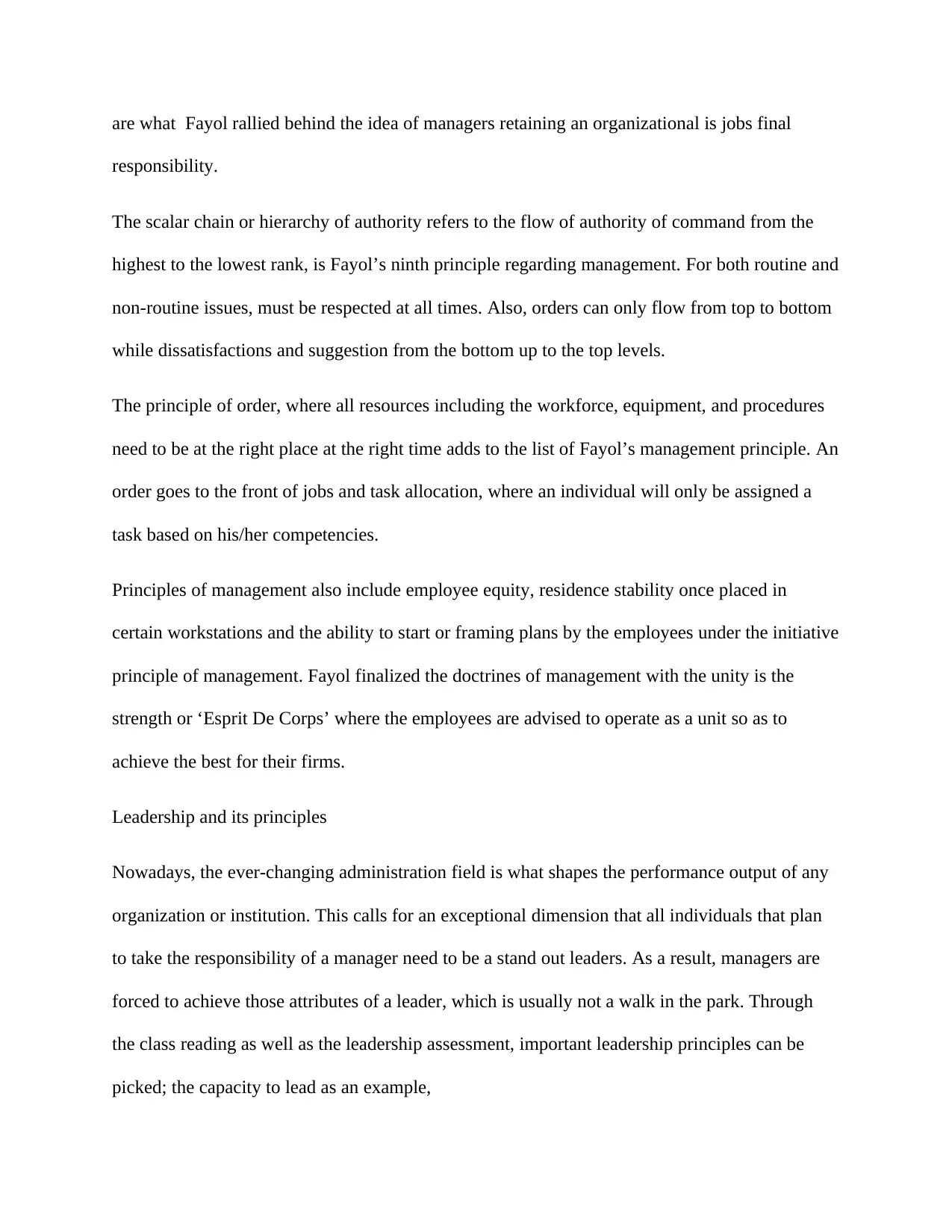
are what Fayol rallied behind the idea of managers retaining an organizational is jobs final
responsibility.
The scalar chain or hierarchy of authority refers to the flow of authority of command from the
highest to the lowest rank, is Fayol’s ninth principle regarding management. For both routine and
non-routine issues, must be respected at all times. Also, orders can only flow from top to bottom
while dissatisfactions and suggestion from the bottom up to the top levels.
The principle of order, where all resources including the workforce, equipment, and procedures
need to be at the right place at the right time adds to the list of Fayol’s management principle. An
order goes to the front of jobs and task allocation, where an individual will only be assigned a
task based on his/her competencies.
Principles of management also include employee equity, residence stability once placed in
certain workstations and the ability to start or framing plans by the employees under the initiative
principle of management. Fayol finalized the doctrines of management with the unity is the
strength or ‘Esprit De Corps’ where the employees are advised to operate as a unit so as to
achieve the best for their firms.
Leadership and its principles
Nowadays, the ever-changing administration field is what shapes the performance output of any
organization or institution. This calls for an exceptional dimension that all individuals that plan
to take the responsibility of a manager need to be a stand out leaders. As a result, managers are
forced to achieve those attributes of a leader, which is usually not a walk in the park. Through
the class reading as well as the leadership assessment, important leadership principles can be
picked; the capacity to lead as an example,
responsibility.
The scalar chain or hierarchy of authority refers to the flow of authority of command from the
highest to the lowest rank, is Fayol’s ninth principle regarding management. For both routine and
non-routine issues, must be respected at all times. Also, orders can only flow from top to bottom
while dissatisfactions and suggestion from the bottom up to the top levels.
The principle of order, where all resources including the workforce, equipment, and procedures
need to be at the right place at the right time adds to the list of Fayol’s management principle. An
order goes to the front of jobs and task allocation, where an individual will only be assigned a
task based on his/her competencies.
Principles of management also include employee equity, residence stability once placed in
certain workstations and the ability to start or framing plans by the employees under the initiative
principle of management. Fayol finalized the doctrines of management with the unity is the
strength or ‘Esprit De Corps’ where the employees are advised to operate as a unit so as to
achieve the best for their firms.
Leadership and its principles
Nowadays, the ever-changing administration field is what shapes the performance output of any
organization or institution. This calls for an exceptional dimension that all individuals that plan
to take the responsibility of a manager need to be a stand out leaders. As a result, managers are
forced to achieve those attributes of a leader, which is usually not a walk in the park. Through
the class reading as well as the leadership assessment, important leadership principles can be
picked; the capacity to lead as an example,
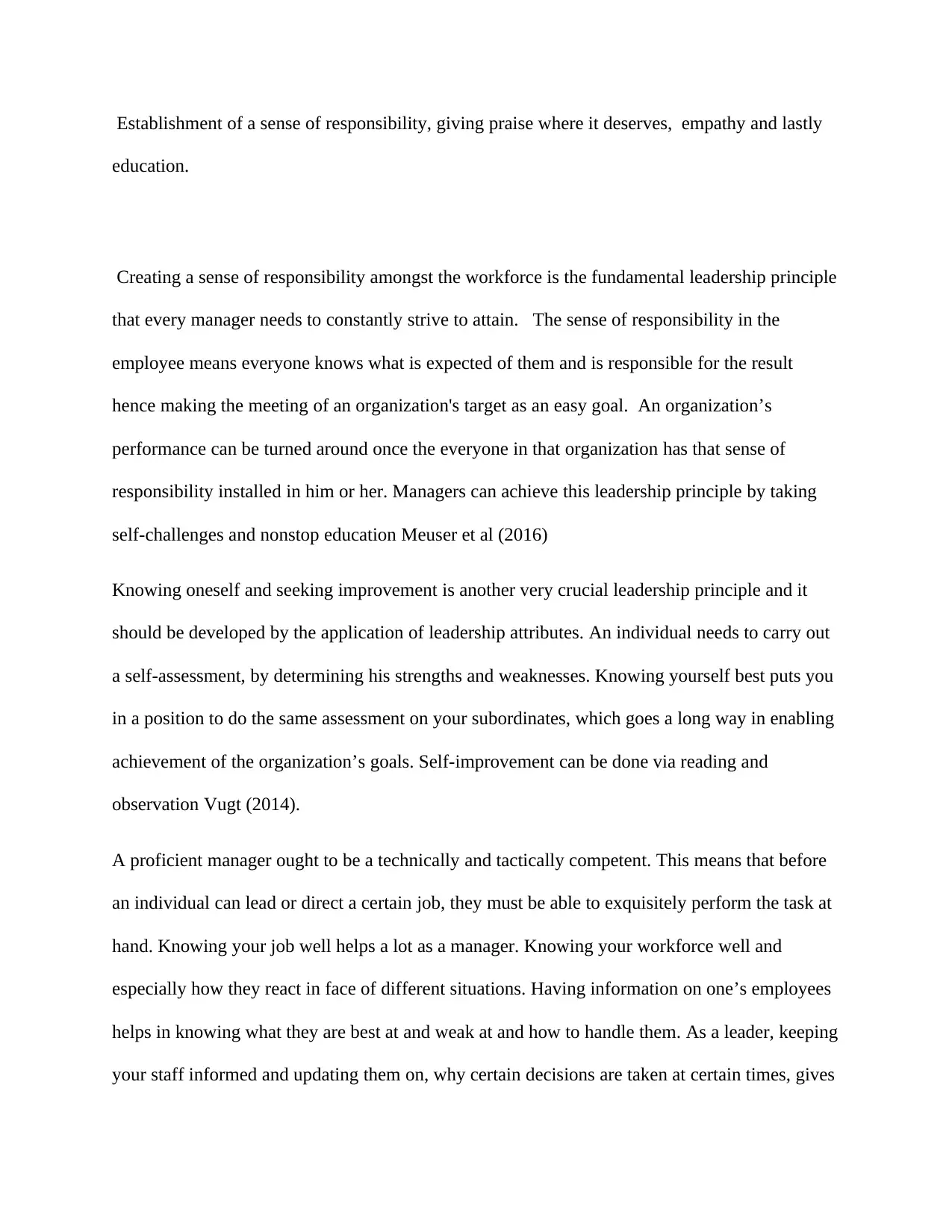
Establishment of a sense of responsibility, giving praise where it deserves, empathy and lastly
education.
Creating a sense of responsibility amongst the workforce is the fundamental leadership principle
that every manager needs to constantly strive to attain. The sense of responsibility in the
employee means everyone knows what is expected of them and is responsible for the result
hence making the meeting of an organization's target as an easy goal. An organization’s
performance can be turned around once the everyone in that organization has that sense of
responsibility installed in him or her. Managers can achieve this leadership principle by taking
self-challenges and nonstop education Meuser et al (2016)
Knowing oneself and seeking improvement is another very crucial leadership principle and it
should be developed by the application of leadership attributes. An individual needs to carry out
a self-assessment, by determining his strengths and weaknesses. Knowing yourself best puts you
in a position to do the same assessment on your subordinates, which goes a long way in enabling
achievement of the organization’s goals. Self-improvement can be done via reading and
observation Vugt (2014).
A proficient manager ought to be a technically and tactically competent. This means that before
an individual can lead or direct a certain job, they must be able to exquisitely perform the task at
hand. Knowing your job well helps a lot as a manager. Knowing your workforce well and
especially how they react in face of different situations. Having information on one’s employees
helps in knowing what they are best at and weak at and how to handle them. As a leader, keeping
your staff informed and updating them on, why certain decisions are taken at certain times, gives
education.
Creating a sense of responsibility amongst the workforce is the fundamental leadership principle
that every manager needs to constantly strive to attain. The sense of responsibility in the
employee means everyone knows what is expected of them and is responsible for the result
hence making the meeting of an organization's target as an easy goal. An organization’s
performance can be turned around once the everyone in that organization has that sense of
responsibility installed in him or her. Managers can achieve this leadership principle by taking
self-challenges and nonstop education Meuser et al (2016)
Knowing oneself and seeking improvement is another very crucial leadership principle and it
should be developed by the application of leadership attributes. An individual needs to carry out
a self-assessment, by determining his strengths and weaknesses. Knowing yourself best puts you
in a position to do the same assessment on your subordinates, which goes a long way in enabling
achievement of the organization’s goals. Self-improvement can be done via reading and
observation Vugt (2014).
A proficient manager ought to be a technically and tactically competent. This means that before
an individual can lead or direct a certain job, they must be able to exquisitely perform the task at
hand. Knowing your job well helps a lot as a manager. Knowing your workforce well and
especially how they react in face of different situations. Having information on one’s employees
helps in knowing what they are best at and weak at and how to handle them. As a leader, keeping
your staff informed and updating them on, why certain decisions are taken at certain times, gives
⊘ This is a preview!⊘
Do you want full access?
Subscribe today to unlock all pages.

Trusted by 1+ million students worldwide
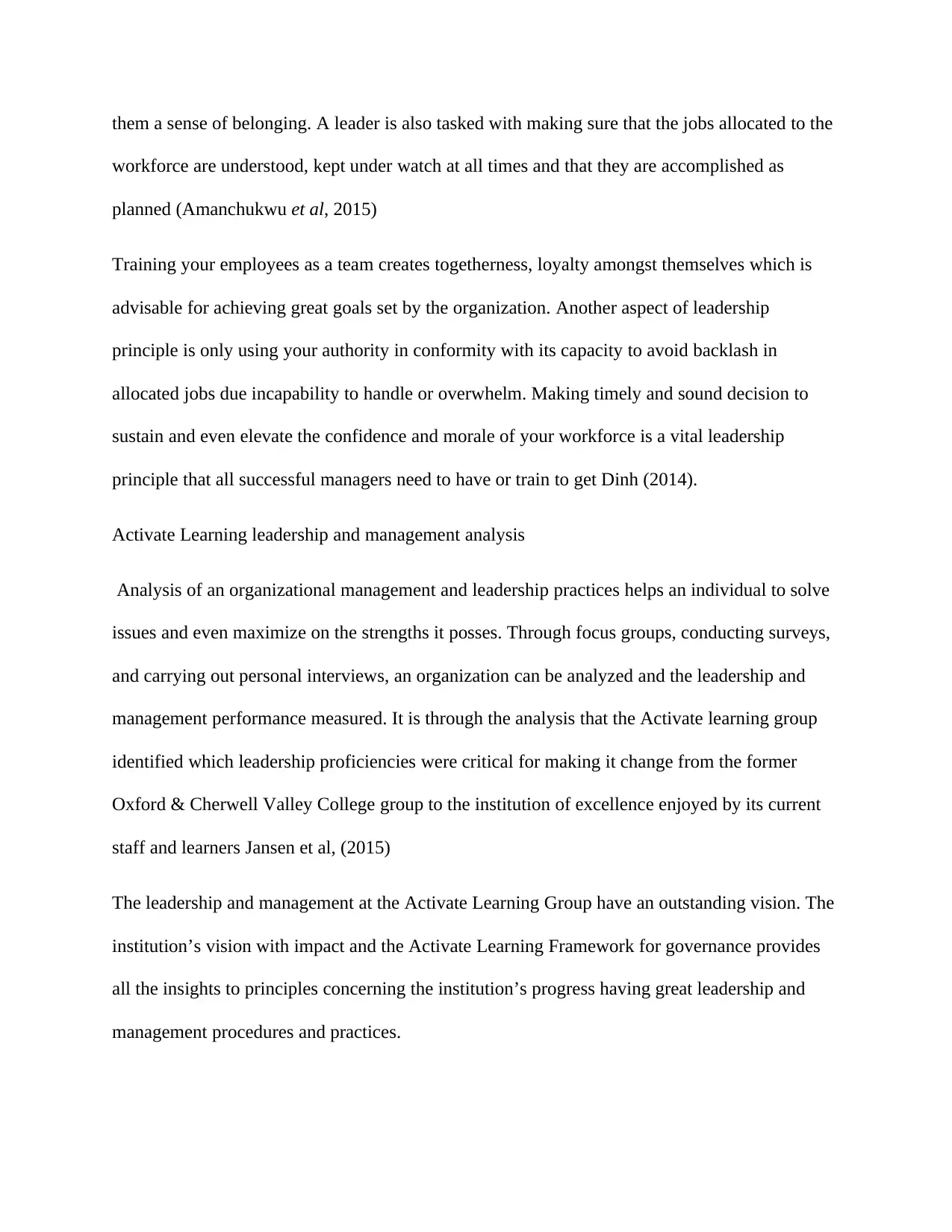
them a sense of belonging. A leader is also tasked with making sure that the jobs allocated to the
workforce are understood, kept under watch at all times and that they are accomplished as
planned (Amanchukwu et al, 2015)
Training your employees as a team creates togetherness, loyalty amongst themselves which is
advisable for achieving great goals set by the organization. Another aspect of leadership
principle is only using your authority in conformity with its capacity to avoid backlash in
allocated jobs due incapability to handle or overwhelm. Making timely and sound decision to
sustain and even elevate the confidence and morale of your workforce is a vital leadership
principle that all successful managers need to have or train to get Dinh (2014).
Activate Learning leadership and management analysis
Analysis of an organizational management and leadership practices helps an individual to solve
issues and even maximize on the strengths it posses. Through focus groups, conducting surveys,
and carrying out personal interviews, an organization can be analyzed and the leadership and
management performance measured. It is through the analysis that the Activate learning group
identified which leadership proficiencies were critical for making it change from the former
Oxford & Cherwell Valley College group to the institution of excellence enjoyed by its current
staff and learners Jansen et al, (2015)
The leadership and management at the Activate Learning Group have an outstanding vision. The
institution’s vision with impact and the Activate Learning Framework for governance provides
all the insights to principles concerning the institution’s progress having great leadership and
management procedures and practices.
workforce are understood, kept under watch at all times and that they are accomplished as
planned (Amanchukwu et al, 2015)
Training your employees as a team creates togetherness, loyalty amongst themselves which is
advisable for achieving great goals set by the organization. Another aspect of leadership
principle is only using your authority in conformity with its capacity to avoid backlash in
allocated jobs due incapability to handle or overwhelm. Making timely and sound decision to
sustain and even elevate the confidence and morale of your workforce is a vital leadership
principle that all successful managers need to have or train to get Dinh (2014).
Activate Learning leadership and management analysis
Analysis of an organizational management and leadership practices helps an individual to solve
issues and even maximize on the strengths it posses. Through focus groups, conducting surveys,
and carrying out personal interviews, an organization can be analyzed and the leadership and
management performance measured. It is through the analysis that the Activate learning group
identified which leadership proficiencies were critical for making it change from the former
Oxford & Cherwell Valley College group to the institution of excellence enjoyed by its current
staff and learners Jansen et al, (2015)
The leadership and management at the Activate Learning Group have an outstanding vision. The
institution’s vision with impact and the Activate Learning Framework for governance provides
all the insights to principles concerning the institution’s progress having great leadership and
management procedures and practices.
Paraphrase This Document
Need a fresh take? Get an instant paraphrase of this document with our AI Paraphraser
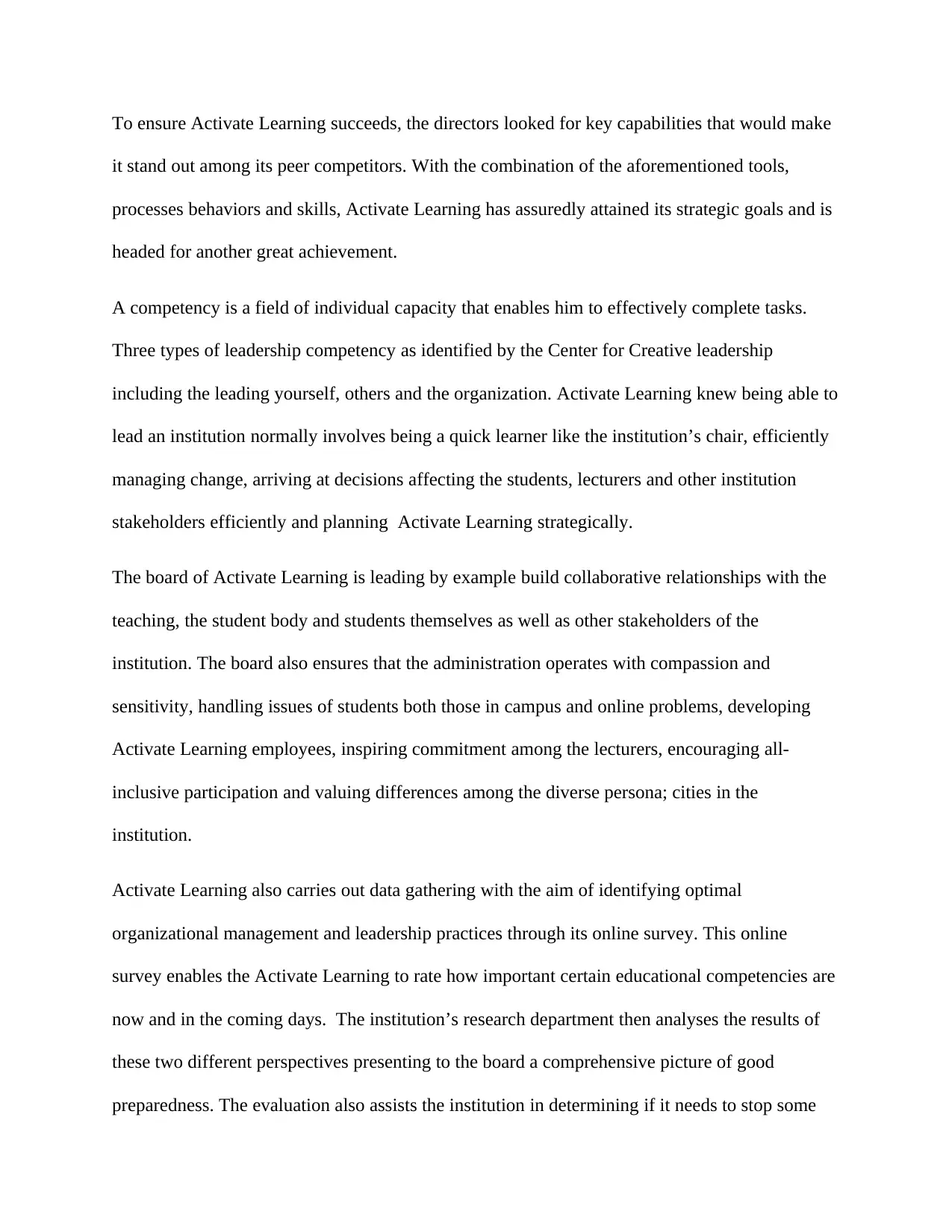
To ensure Activate Learning succeeds, the directors looked for key capabilities that would make
it stand out among its peer competitors. With the combination of the aforementioned tools,
processes behaviors and skills, Activate Learning has assuredly attained its strategic goals and is
headed for another great achievement.
A competency is a field of individual capacity that enables him to effectively complete tasks.
Three types of leadership competency as identified by the Center for Creative leadership
including the leading yourself, others and the organization. Activate Learning knew being able to
lead an institution normally involves being a quick learner like the institution’s chair, efficiently
managing change, arriving at decisions affecting the students, lecturers and other institution
stakeholders efficiently and planning Activate Learning strategically.
The board of Activate Learning is leading by example build collaborative relationships with the
teaching, the student body and students themselves as well as other stakeholders of the
institution. The board also ensures that the administration operates with compassion and
sensitivity, handling issues of students both those in campus and online problems, developing
Activate Learning employees, inspiring commitment among the lecturers, encouraging all-
inclusive participation and valuing differences among the diverse persona; cities in the
institution.
Activate Learning also carries out data gathering with the aim of identifying optimal
organizational management and leadership practices through its online survey. This online
survey enables the Activate Learning to rate how important certain educational competencies are
now and in the coming days. The institution’s research department then analyses the results of
these two different perspectives presenting to the board a comprehensive picture of good
preparedness. The evaluation also assists the institution in determining if it needs to stop some
it stand out among its peer competitors. With the combination of the aforementioned tools,
processes behaviors and skills, Activate Learning has assuredly attained its strategic goals and is
headed for another great achievement.
A competency is a field of individual capacity that enables him to effectively complete tasks.
Three types of leadership competency as identified by the Center for Creative leadership
including the leading yourself, others and the organization. Activate Learning knew being able to
lead an institution normally involves being a quick learner like the institution’s chair, efficiently
managing change, arriving at decisions affecting the students, lecturers and other institution
stakeholders efficiently and planning Activate Learning strategically.
The board of Activate Learning is leading by example build collaborative relationships with the
teaching, the student body and students themselves as well as other stakeholders of the
institution. The board also ensures that the administration operates with compassion and
sensitivity, handling issues of students both those in campus and online problems, developing
Activate Learning employees, inspiring commitment among the lecturers, encouraging all-
inclusive participation and valuing differences among the diverse persona; cities in the
institution.
Activate Learning also carries out data gathering with the aim of identifying optimal
organizational management and leadership practices through its online survey. This online
survey enables the Activate Learning to rate how important certain educational competencies are
now and in the coming days. The institution’s research department then analyses the results of
these two different perspectives presenting to the board a comprehensive picture of good
preparedness. The evaluation also assists the institution in determining if it needs to stop some
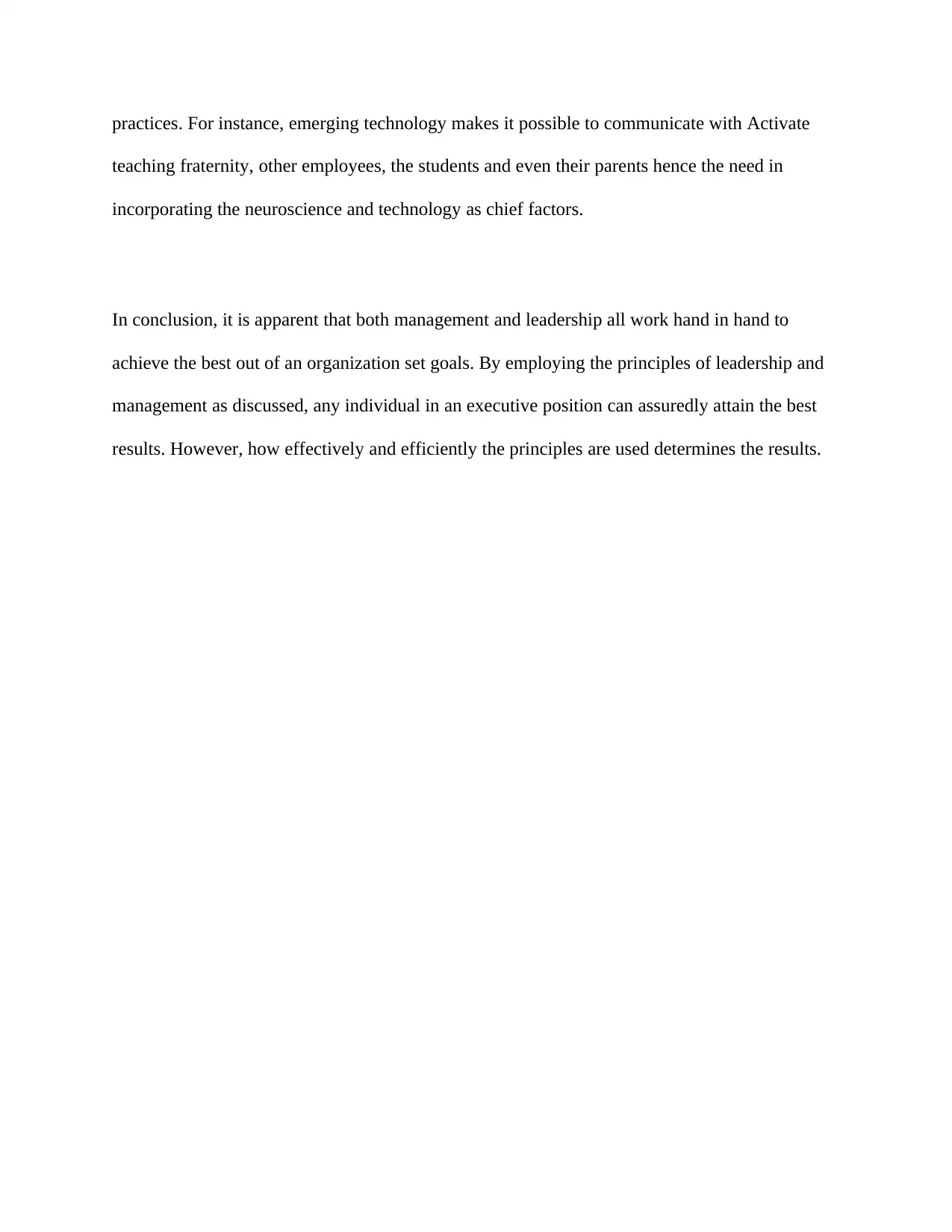
practices. For instance, emerging technology makes it possible to communicate with Activate
teaching fraternity, other employees, the students and even their parents hence the need in
incorporating the neuroscience and technology as chief factors.
In conclusion, it is apparent that both management and leadership all work hand in hand to
achieve the best out of an organization set goals. By employing the principles of leadership and
management as discussed, any individual in an executive position can assuredly attain the best
results. However, how effectively and efficiently the principles are used determines the results.
teaching fraternity, other employees, the students and even their parents hence the need in
incorporating the neuroscience and technology as chief factors.
In conclusion, it is apparent that both management and leadership all work hand in hand to
achieve the best out of an organization set goals. By employing the principles of leadership and
management as discussed, any individual in an executive position can assuredly attain the best
results. However, how effectively and efficiently the principles are used determines the results.
⊘ This is a preview!⊘
Do you want full access?
Subscribe today to unlock all pages.

Trusted by 1+ million students worldwide
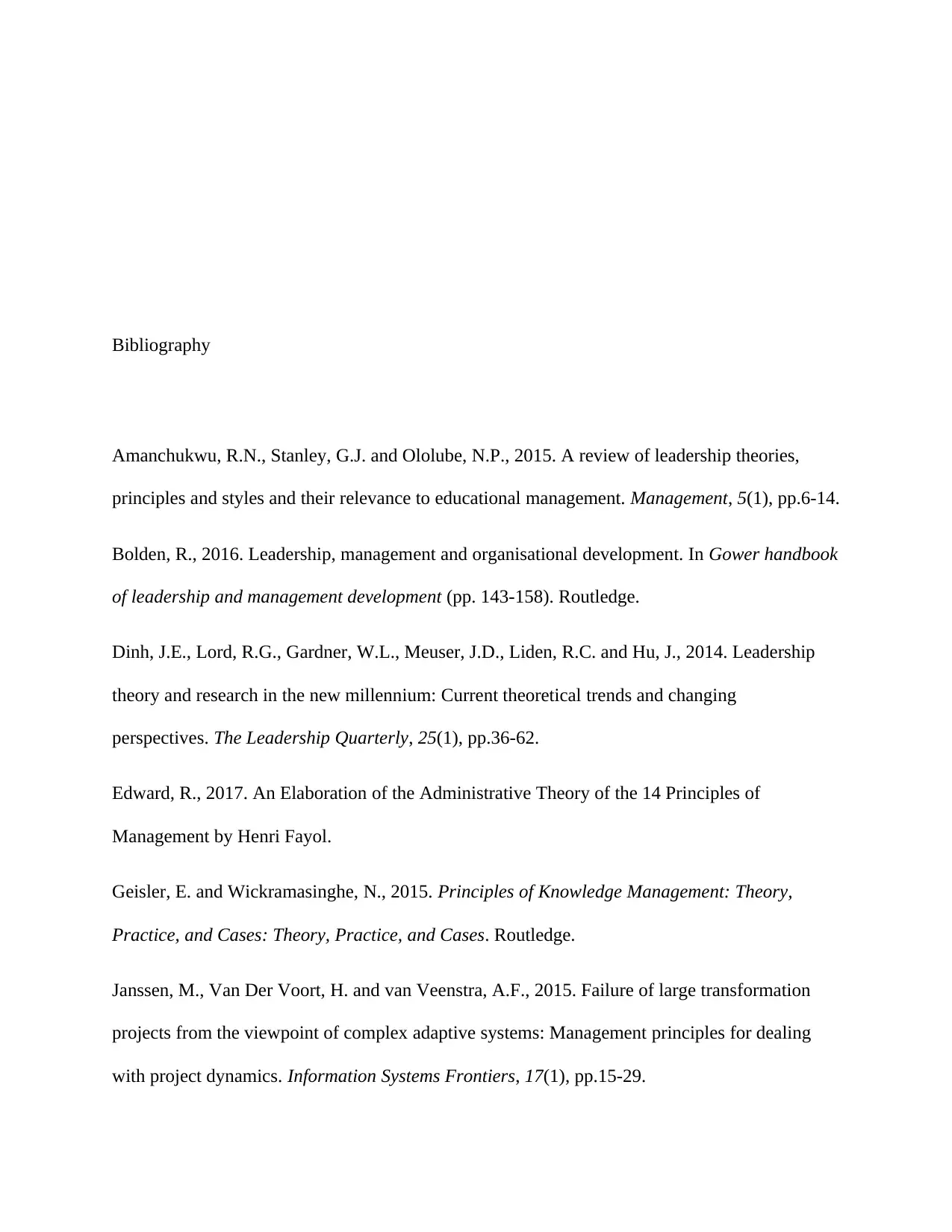
Bibliography
Amanchukwu, R.N., Stanley, G.J. and Ololube, N.P., 2015. A review of leadership theories,
principles and styles and their relevance to educational management. Management, 5(1), pp.6-14.
Bolden, R., 2016. Leadership, management and organisational development. In Gower handbook
of leadership and management development (pp. 143-158). Routledge.
Dinh, J.E., Lord, R.G., Gardner, W.L., Meuser, J.D., Liden, R.C. and Hu, J., 2014. Leadership
theory and research in the new millennium: Current theoretical trends and changing
perspectives. The Leadership Quarterly, 25(1), pp.36-62.
Edward, R., 2017. An Elaboration of the Administrative Theory of the 14 Principles of
Management by Henri Fayol.
Geisler, E. and Wickramasinghe, N., 2015. Principles of Knowledge Management: Theory,
Practice, and Cases: Theory, Practice, and Cases. Routledge.
Janssen, M., Van Der Voort, H. and van Veenstra, A.F., 2015. Failure of large transformation
projects from the viewpoint of complex adaptive systems: Management principles for dealing
with project dynamics. Information Systems Frontiers, 17(1), pp.15-29.
Amanchukwu, R.N., Stanley, G.J. and Ololube, N.P., 2015. A review of leadership theories,
principles and styles and their relevance to educational management. Management, 5(1), pp.6-14.
Bolden, R., 2016. Leadership, management and organisational development. In Gower handbook
of leadership and management development (pp. 143-158). Routledge.
Dinh, J.E., Lord, R.G., Gardner, W.L., Meuser, J.D., Liden, R.C. and Hu, J., 2014. Leadership
theory and research in the new millennium: Current theoretical trends and changing
perspectives. The Leadership Quarterly, 25(1), pp.36-62.
Edward, R., 2017. An Elaboration of the Administrative Theory of the 14 Principles of
Management by Henri Fayol.
Geisler, E. and Wickramasinghe, N., 2015. Principles of Knowledge Management: Theory,
Practice, and Cases: Theory, Practice, and Cases. Routledge.
Janssen, M., Van Der Voort, H. and van Veenstra, A.F., 2015. Failure of large transformation
projects from the viewpoint of complex adaptive systems: Management principles for dealing
with project dynamics. Information Systems Frontiers, 17(1), pp.15-29.
Paraphrase This Document
Need a fresh take? Get an instant paraphrase of this document with our AI Paraphraser
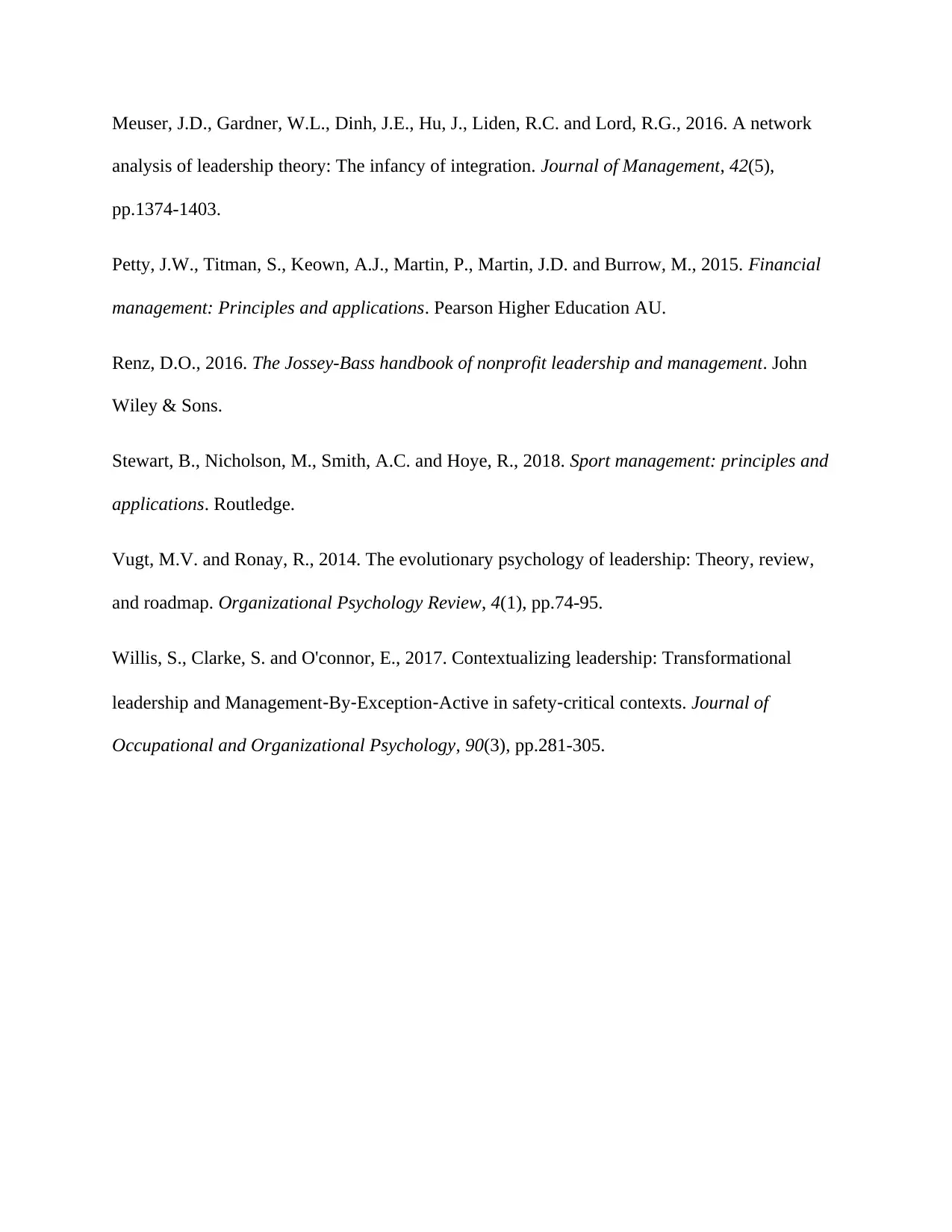
Meuser, J.D., Gardner, W.L., Dinh, J.E., Hu, J., Liden, R.C. and Lord, R.G., 2016. A network
analysis of leadership theory: The infancy of integration. Journal of Management, 42(5),
pp.1374-1403.
Petty, J.W., Titman, S., Keown, A.J., Martin, P., Martin, J.D. and Burrow, M., 2015. Financial
management: Principles and applications. Pearson Higher Education AU.
Renz, D.O., 2016. The Jossey-Bass handbook of nonprofit leadership and management. John
Wiley & Sons.
Stewart, B., Nicholson, M., Smith, A.C. and Hoye, R., 2018. Sport management: principles and
applications. Routledge.
Vugt, M.V. and Ronay, R., 2014. The evolutionary psychology of leadership: Theory, review,
and roadmap. Organizational Psychology Review, 4(1), pp.74-95.
Willis, S., Clarke, S. and O'connor, E., 2017. Contextualizing leadership: Transformational
leadership and Management‐By‐Exception‐Active in safety‐critical contexts. Journal of
Occupational and Organizational Psychology, 90(3), pp.281-305.
analysis of leadership theory: The infancy of integration. Journal of Management, 42(5),
pp.1374-1403.
Petty, J.W., Titman, S., Keown, A.J., Martin, P., Martin, J.D. and Burrow, M., 2015. Financial
management: Principles and applications. Pearson Higher Education AU.
Renz, D.O., 2016. The Jossey-Bass handbook of nonprofit leadership and management. John
Wiley & Sons.
Stewart, B., Nicholson, M., Smith, A.C. and Hoye, R., 2018. Sport management: principles and
applications. Routledge.
Vugt, M.V. and Ronay, R., 2014. The evolutionary psychology of leadership: Theory, review,
and roadmap. Organizational Psychology Review, 4(1), pp.74-95.
Willis, S., Clarke, S. and O'connor, E., 2017. Contextualizing leadership: Transformational
leadership and Management‐By‐Exception‐Active in safety‐critical contexts. Journal of
Occupational and Organizational Psychology, 90(3), pp.281-305.
1 out of 11
Related Documents
Your All-in-One AI-Powered Toolkit for Academic Success.
+13062052269
info@desklib.com
Available 24*7 on WhatsApp / Email
![[object Object]](/_next/static/media/star-bottom.7253800d.svg)
Unlock your academic potential
Copyright © 2020–2026 A2Z Services. All Rights Reserved. Developed and managed by ZUCOL.





